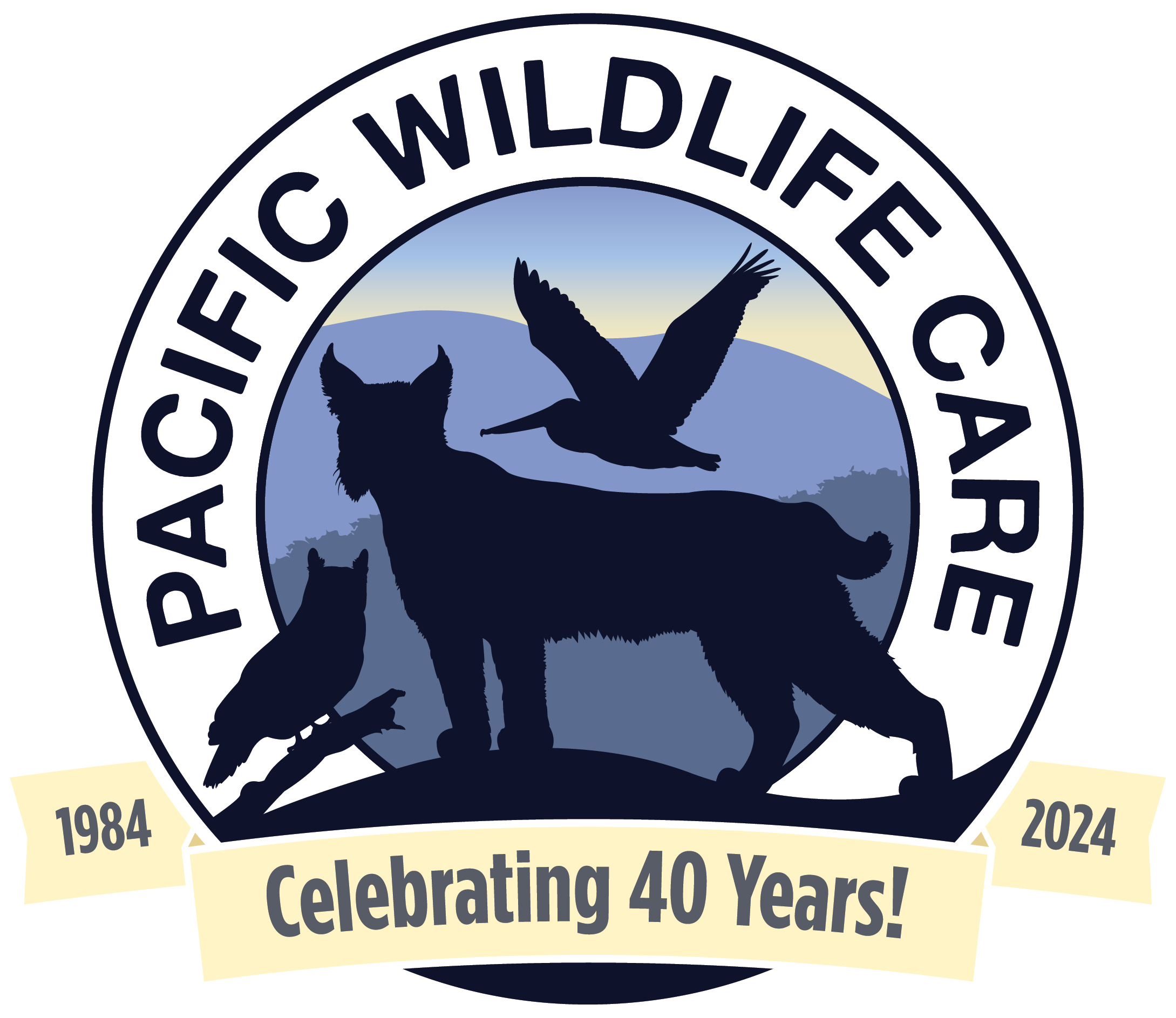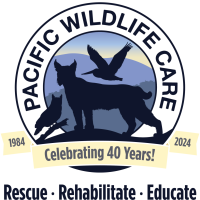Volunteers Make a Difference!
Our Wildlife Hotline volunteers are like our 911 operators. Our Rescue/Transport volunteers are like ambulance or fire department first responders. Our Rehabilitation Center is like the hospital. No matter what you do, your contribution of time makes a big difference and gives wildlife a second chance.
Here is a brief overview of some ways you can help by becoming a volunteer.
Wildlife Hotline
PWC maintains a Wildlife Hotline–answered live or via voicemail–that anyone in our County can call 365 days a year to get help for distressed animals. Wildlife Hotline Volunteers are the front line in our efforts to save wildlife – they are problem solvers who use a variety of resources to respond to questions and find help for wildlife. Working at the Center, Hotline volunteers answer live and check the Hotline voicemail at least three times an hour. They typically work in 4-hour weekly shifts. Our Hotline is monitored from 8:00 AM to 4:00 PM and longer into the evening during busy spring and summer months. Hotline volunteers are supported by staff and online resources. Hotline volunteers should be able to communicate calmly and courteously with callers who may be highly emotional, and not overwhelmed by complex scenarios or multiple calls. They should be comfortable using a computer, be well organized and detail oriented, and have excellent interpersonal skills. Training and mentoring are part of all the work that we do.
Rescue/Transport
When Hotline callers are unable to transport an animal in distress to PWC’s Rehabilitation Center in Morro Bay, Rescue Transport Volunteers (RTVs) who live near that area are asked to transport animals to the Center. RTVs are trained to assess situations upon arrival and determine what is in the animal’s best interest. PWC staff are available via phone to help RTV volunteers identify the best course of action. Volunteers determine their own comfort level regarding capture and transport. Some RTVs prefer to only transport animals that are already contained. Others want to attempt actual capture of distressed wildlife, using a variety of techniques and equipment that volunteers will receive extensive training to use. RTVs are given basic training in safe wildlife handling techniques and personal safety equipment. Additional training classes are held throughout the year. RTVs need a valid driver’s license, access to a vehicle, and a cell phone. RTVs are asked to be on call for at least 8 hours a month.
Rehabilitation Center
Center volunteers work under the supervision of our highly trained staff and support the Center’s efforts in a myriad of ways. Much of the support involves housekeeping, such as washing dishes and crates, doing laundry, and keeping the Center clean. With training and experience, volunteers will also help with animal care. They will prepare food and supplements, feed and water the animals, keep whiteboards up to date, and alert staff of any changes or concerns. More advanced animal handling may include tube-feeding, administering medications, reading blood values, and handling of animals during treatment. Center volunteers are asked to sign up for a regular 4-hour shift on a weekly basis. Volunteers should wear long pants and closed-toed shoes. We strongly suggest that you do not wear clothes you don’t want to get stained.
Baby Bird Room
PWC receives many baby birds during the nesting and fledging season – typically from March through August. Our Baby Bird Room (BBR) volunteers provide the critical care that makes the difference between helping a bird to heal and grow so it can be released back into the wild. Volunteers work in 4-hour shifts: cleaning bird enclosures, feeding instruments, and the BBR itself; preparing formula and feeding the baby birds that need food every 15-60 minutes over a 12-hour day. Perhaps most important is observing and documenting any changes or actions taken, and alerting staff to any problems. It’s also important that volunteers are able to remain calm in a noisy and demanding environment. Training is provided, and volunteers are encouraged to grow their skill set and comfort level as they gain more experience.
Front Desk
Front Desk volunteers wear many hats. They answer the Center’s phone and are the first face that the public and animal rescuers see when they arrive at the Center, so it’s important that people feel welcome and can rely on someone to find answers for them. Front Desk volunteers also help with various clerical and administrative tasks, such as creating and maintaining intake records and updating animal status in the WRMD database system and filing various regulatory forms. They even help in the Baby Bird Room or folding laundry when time permits. Many hats – important job! Front Desk volunteers should have basic computer skills, including data entry. We ask volunteers to commit to a four-hour shift each week.
Facility Maintenance
Our Center Director works with volunteers to ensure the Center is clean and organized, and that its equipment and systems are well maintained. Facility maintenance includes outdoor systems such as pools, wash stations, trash removal and recyclables, pen construction, and landscaping. Interior systems include exhaust fans, equipment, water and fire, and air filter systems. If volunteers have appropriate skills and experience they might be asked to help with improvements to existing facilities and construction of new projects.
Other Volunteer Opportunities
Not only do we need your assistance in the care of thousands of wildlife patients, we also need help with fundraising, grant writing, and other administrative tasks. Volunteers may be asked to help out at a booth during special events or open houses, or assist at fundraising parties or benefits. Each and every task is essential to the ongoing operation of PWC and our volunteers are greatly appreciated for their time, energy and commitment.
Responsibilities and Licensing
PWC’s mission is to support San Luis Obispo County wildlife through rehabilitation and educational outreach. The goal of all wildlife rehabilitators is to provide the best care possible without jeopardizing the wildness of the animal. Rehabilitation promotes the health and well-being of the animal without infringing on its natural behavior. Our care must not add to an animal’s stress by unnecessary touching or talking.
We also realize the importance of avoiding unnecessary contact with an animal that encourages it to become habituated to humans, which could prevent that animal’s successful return to the wild. We understand the sympathetic feelings that people have for wildlife and the desire to connect with them. However, for the animal’s sake, as well as PWC’s licensing both with the California Department of Fish & Wildlife (CDFW) and the U.S. Wildlife Services, it is critical that we respect wildlife rehabilitation guidelines and protocols.
Ready to Volunteer?
Click on the “SIGN UP” button below or call us today! 805-543-9453.

